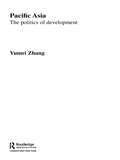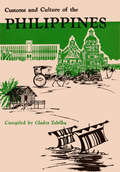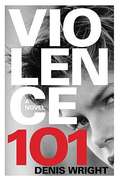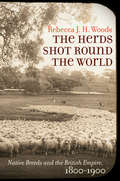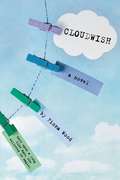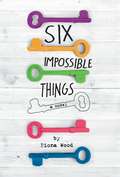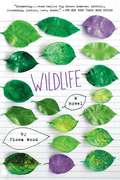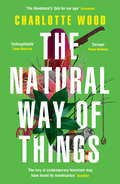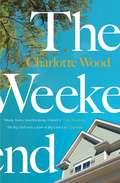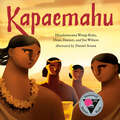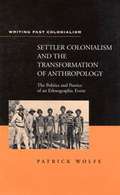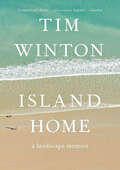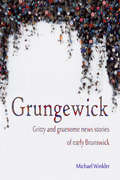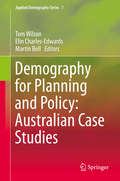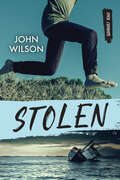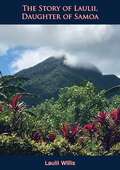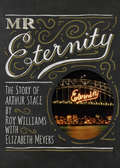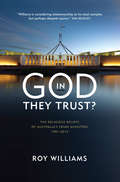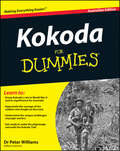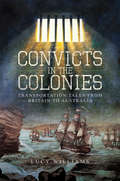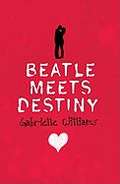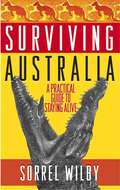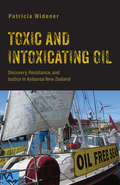- Table View
- List View
Pacific Asia
by Yumei ZhangPacific Asia has witnessed arguably the most dynamic economic growth and social transformation in the world since 1945. Inspired by the example of Japan, a number of high performing economies have emerged in the region. Pacific Asia explores this extraordinary pace of development and explains the various factors that lie behind it. It introduces the complex politics of development and sets Pacific Asia in its geographical and socio-cultural context. As well as Japan, the role model of development, Pacific Asia examines the experiences of Malaysia, Indonesia, Thailand, Singapore, South Korea and Taiwan.
Customs and Culture of the Philippines
by Gladys ZabilkaGaldys Zabilka, author of Customs and Culture of Okinawa, has once again created an informal and interesting compilation for the overseas traveler or the armchair tourist, this time on the colorful Philippines. The reader will be introduced to quaint customs, tourist attractions, folk songs, foods, and sports along with a general review of Philippine history and racial background. Almost very aspect of Filipino life is touched upon in this handy little volume. Delightful illustrations for each chapter were done by M. Kuwata. Musical scores of several Philippine folk songs are included in the last chapter.
How Australia Decides
by Sally YoungIn recent years, the Australian media have come under fire for their reporting of politics and election campaigns. Political reporting is said to be too influenced by commercial concerns, too obsessed with gossip and scandal, and too focused on trivia and 'sound bites' at the expense of serious issues. There are accusations of bias, sensationalism, 'lazy' journalism and 'horse-race' reporting that is obsessed with opinion polls. How Australia Decides is the first book to put these allegations to the test. Based on a four-year empirical study, Sally Young reports the results of the only systematic, historical and in-depth analysis of Australian election reporting. This groundbreaking book shows how election reporting has changed over time, and how political news audiences, news production and shifts in political campaigning are influencing media content, Ai with profound implications for Australian democracy.
Violence 101
by Denis WrightFourteen year-old Hamish doesn't simply do terrible things, he is committed to the belief that violence is the solution to the obstacles in life. But Hamish is also extremely smart, and extremely self-aware. And he considers everyone around him-the other institutionalized boys, his teachers and wardens, the whole world-as sheep, blindly following society's rules, unaware of what really dictates our existence. Hamish's heroes, like Alexander the Great, understood that violence drives us all. Through mesmerizing journal entries, Violence 101 paints a disturbing yet utterly compelling picture of an extremely bright, extremely misguided adolescent who must navigate a world that encourages aggressive behavior at every turn, but then struggles to help a young man who doesn't know where to draw the line between appropriate and inappropriate behavior. .
The Herds Shot Round the World: Native Breeds and the British Empire, 1800–1900 (Flows, Migrations, and Exchanges)
by Rebecca J. WoodsAs Britain industrialized in the early nineteenth century, animal breeders faced the need to convert livestock into products while maintaining the distinctive character of their breeds. Thus they transformed cattle and sheep adapted to regional environments into bulky, quick-fattening beasts. Exploring the environmental and economic ramifications of imperial expansion on colonial environments and production practices, Rebecca J. H. Woods traces how global physiological and ecological diversity eroded under the technological, economic, and cultural system that grew up around the production of livestock by the British Empire. Attending to the relationship between type and place and what it means to call a particular breed of livestock "native," Woods highlights the inherent tension between consumer expectations in the metropole and the ecological reality at the periphery.Based on extensive archival work in the United Kingdom, New Zealand, and Australia, this study illuminates the connections between the biological consequences and the politics of imperialism. In tracing both the national origins and imperial expansion of British breeds, Woods uncovers the processes that laid the foundation for our livestock industry today.
Cloudwish
by Fiona WoodAward-winning author Fiona Wood delivers a thought-provoking story of self-discovery and first love-one that will resonate with anyone who has ever realized that the things that make you different are the things that make you...you. For Vân Uoc, fantasies fall into two categories: nourishing or pointless. Daydreaming about attending her own art opening? Nourishing. Daydreaming about Billy Gardiner, star of the rowing team who doesn't even know she's alive? Pointless.So Vân Uoc tries to stick to her reality-keeping a low profile as a scholarship student at her prestigious Melbourne private school, managing her mother's PTSD from a traumatic emigration from Vietnam, and admiring Billy from afar. Until she makes a wish that inexplicably (possibly magically) comes true. Billy actually notices her. In fact, he seems to genuinely like her. But as they try to fit each other into their very different lives, confounding parents and confusing friends, Vân Uoc can't help but wonder why Billy has suddenly fallen for her. Is it the magic of first love, or is it magic from a well-timed wish that will eventually, inevitably, come to an end?
Six Impossible Things
by Fiona Wood1. Kiss Estelle.2. Get a job.3. Cheer my mother up.4. Try not to be a complete nerd/loser.5. Talk to my father when he calls.6. Figure out how to be good.Nerd-boy Dan Cereill is not quite coping with a whole heap of problems, including a reversal of family fortune, moving, new-school hell, a mother with a failing wedding cake business, a just-out gay dad, and a massive crush on Estelle, the girl next door. His life is a mess, but for now he's narrowed it down to just six impossible things.... In this charming story of one guy's efforts to get it together when his life is falling apart, award-winning author Fiona Wood introduces an irresistible voice and a delightfully awkward character who is impossible to forget.
Wildlife
by Fiona WoodDuring a semester in the wilderness, sixteen-year-old Sib expects the tough outdoor education program and the horrors of dorm life, but friendship drama and an unexpected romance with popular Ben Capaldi? That will take some navigating. New girl Lou has zero interest in fitting in, or joining in. Still reeling from a loss that occurred almost a year ago, she just wants to be left alone. But as she witnesses a betrayal unfolding around Sib and her best friend Holly, Lou can't help but be drawn back into the land of the living. Fans of Melina Marchetta, Rainbow Rowell, and E. Lockhart will adore this endearing and poignant story of first love, true friendship, and going a little bit wild.
The Natural Way of Things: 'The Handmaid's Tale for our age' (Economist)
by Charlotte Wood'Savage: think Atwood in the outback' Paula Hawkins, author of The Girl on the Train'An unforgettable reading experience' Liane Moriarty, author of Big Little Lies'Ferocious... recalls the early Elena Ferrante' NPR'A masterpiece' Guardian'Devastating' EconomistShe hears her own thick voice deep inside her ears when she says, 'I need to know where I am.'The man stands there, tall and narrow, hand still on the doorknob, surprised.He says, almost in sympathy, 'Oh, sweetie. You need to know what you are.'"Two women awaken from a drugged sleep to find themselves imprisoned in a brokendownproperty in the middle of a desert.Strangers to each other, they have no idea where they are or how they came to be therewith eight other girls, their heads shaved, guarded by two inept yet vicious jailers.Doing hard labour under a sweltering sun, the prisoners soon learn what links them: ineach girl's past is a sexual scandal with a powerful man.They pray for rescue but as the hours turn into days and the days into weeks and months,it becomes clear only the girls can rescue themselves. Winner, 2016 Stella PrizeWinner, 2016 Indie Book of the Year AwardWinner, Fiction Book of the Year, 2016 Indie Book AwardWinner, 2016 Prime Minister's Literary Award for FictionWinner, Reader's Choice, 2016 ABIA Literary Fiction Book of the Year Shortlisted, 2016 Miles Franklin Literary AwardShortlisted, 2016 ABA Nielsen BookData Booksellers Choice AwardLonglisted, 2017 International Dublin Literary Award
The Weekend: The international bestseller, shortlisted for the Stella Prize 2020
by Charlotte WoodA #1 INTERNATIONAL BESTSELLER One of The Times books of the year: 'Ripples with wit, insight and vitality' 'The Weekend is so great I am struggling to find the words to do it justice... Wood is an agonisingly gifted writer: I am now going to read all her other books!'Marian Keyes'It was refreshing to encounter a novel that so profoundly sympathises with women on the forbidding cusp of being classified as "elderly". Wood ably conveys that older women didn't used to be old, and that the experience of ageing is universally bewildering'Lionel Shriver (Observer, Books of the year) 'Riveting' Elizabeth Day 'A perfect, funny, insightful, novel about women, friendship, and ageing. I loved it'Nina Stibbe 'Authentic, funny, brutally well-observed... As with the novels of Elizabeth Strout or Anne Tyler, these are characters not written to please, but to feel true'The Sunday Times 'Glorious... Charlotte Wood joins the ranks of writers such as Nora Ephron, Penelope Lively and Elizabeth Strout' Guardian'The Weekend triumphantly brings to life the honest, inner lives of women' Independent'A lovely, lively, intelligent, funny book' Tessa Hadley 'One sharp, funny, heartbreaking and gorgeously-written package. I loved it' Paula Hawkins'One of those deceptively compact novels that continues to open doors in your mind long after the last page' Patrick GaleSylvie, Jude, Wendy and Adele have a lifelong friendship of the best kind: loving, practical, frank and steadfast. But when Sylvie dies, the ground shifts dangerously for the remaining three.These women couldn't be more different: Jude, a once-famous restaurateur with a spotless life and a long-standing affair with a married man; Wendy, an acclaimed feminist intellectual; Adele, a former star of the stage, now practically homeless. Struggling to recall exactly why they've remained close all these years, the grieving women gather for one last weekend at Sylvie's old beach house. But fraying tempers, an elderly dog, unwelcome guests and too much wine collide in a storm that brings long-buried hurts to the surface - a storm that will either remind them of the bond they share, or sweep away their friendship for good.
Kapaemahu
by Hinaleimoana Wong-Kalu Dean Hamer Joe WilsonAn Indigenous legend about how four extraordinary individuals of dual male and female spirit, or Mahu, brought healing arts from Tahiti to Hawaii, based on the Academy Award–contending short film. In the 15th century, four Mahu sail from Tahiti to Hawaii and share their gifts of science and healing with the people of Waikiki. The islanders return this gift with a monument of four boulders in their honor, which the Mahu imbue with healing powers before disappearing. As time passes, foreigners inhabit the island and the once-sacred stones are forgotten until the 1960s. Though the true story of these stones was not fully recovered, the power of the Mahu still calls out to those who pass by them at Waikiki Beach today. With illuminating words and stunning illustrations by Hinaleimoana Wong-Kalu, Dean Hamer, Joe Wilson, and Daniel Sousa, KAPAEMAHU is a monument to an Indigenous Hawaiian legend and a classic in the making.
Settler Colonialism And The Transformation Of Anthropology: The Politics And Poetics Of An Ethnographic Event (Writing Past Colonialism)
by Patrick WolfeThis work analyzes the politics of anthropological knowledge from critical perspective that alters existing understandings of colonialism. At the same time, it produces insights into the history of anthropology. Organized around an historical reconstruction of the great anthropological controversy over doctrines of virgin birth, the book argues that the allegation a great deal about European colonial discourse and little if anything about indigenous beliefs. By means of an Australian example, the book shows not only that the alleged ignorance was an artifact of the anthropological theory that produced it, but also that the anthropology was an artifact of the anthropological theory that produced it, but also that the anthropology concerned has been closely tied into both the historical dispossession and the continuing oppression of native peoples. The author explores the links between metropolitan anthropological theory and local colonial politics from the 19th century up to the present, settler colonialism, and the ideological and sexual regimes that characterize it.
Island Home: A Landscape Memoir
by Tim WintonThe writer explores his beloved Australia in a memoir that is “a delight to read [and] a call to arms . . . It beseeches us to revere the land that sustains us” (Guardian).From boyhood, Tim Winton’s relationship with the world around him?rock pools, sea caves, scrub, and swamp?has been as vital as any other connection. Camping in hidden inlets, walking in high rocky desert, diving in reefs, bobbing in the sea between surfing sets, Winton has felt the place seep into him, and learned to see landscape as a living process. In Island Home, Winton brings this landscape?and its influence on the island nation’s identity and art?vividly to life through personal accounts and environmental history.Wise, rhapsodic, exalted?in language as unexpected and wild as the landscape it describes?Island Home is a brilliant, moving portrait of Australia from one of its finest writers, the prize-winning author of Breath, Eyrie, and The Shepherd’s Hut, among other acclaimed titles.
Grungewick
by Michael WinklerMurder. Mayhem. Misdeeds. In the nineteenth century, Brunswick was a satellite suburb of Melbourne. While the big city boomed, Brunswick was a place of "bricks and pottery, mud and poverty" with the unruliness of a frontier town. This collection of contemporary newspaper stories provides a vivid picture of the seamy side of life in 1800s Brunswick. It includes famous outrages such as the trial and execution of 'baby farmer' Frances Knorr; Mary Ryckman attacking her neighbour with dynamite; and the outbreak of Irish sectarian violence in Sydney Road. It also captures lesser-known incidents that, together, portray a much harder time: street larrikins, pub brawls, industrial deaths, poisoning both accidental and deliberate. Grungewick provides an unusual window into Australian life in the 1800s and shows that, even when times are toughest, the dignity and resilience of everyday people can shine through.
Demography for Planning and Policy: Australian Case Studies
by Tom Wilson Elin Charles-Edwards Martin BellThis edited collection shows how demographic analysis plays a pivotal role in planning, policy and funding decisions in Australia. Drawing on the latest demographic data and methods, these case studies in applied demography demonstrate that population dynamics underpin the full spectrum of contemporary social, economic and political issues. The contributors harness a range of demographic statistics and develop innovative techniques demonstrating how population dynamics influence issues such as electoral representation, the distribution of government funding, metropolitan and local planning, the provision of aged housing, rural depopulation, coastal growth, ethnic diversity and the well-being of Australia's Indigenous community. Moving beyond simple statistics, the case studies show that demographic methods and models offer crucial insights into contemporary problems and provide essential perspectives to aid efficiency, equity in public policy and private sector planning. Together the volume represents essential reading for students across the social sciences as for policy makers in government and private industry.
Stolen (Orca Currents)
by John WilsonOn a visit to a seaside town in Australia, fifteen-year-old Sam meets Annabel, who works at the local museum. Annabel's interest in history is infectious, and Sam soon finds himself eager to hunt for the remains of a boat called the Mahogany Ship--a shipwreck sought after by many. When a storm creates an erosion hole that exposes a structure, Sam and Annabel are convinced it's the fabled ship. Soon all of the museum staff are at the erosion site to check it out. But the same storm also destroys the museum's power; someone knows the alarms aren't working and steals the museum's most treasured artifact, a large porcelain peacock worth $4 million. As Sam and Annabel search for the thief, they realize there may be a link between the fabled shipwreck and the recent theft.
The Story of Laulii, Daughter of Samoa: Daughter Of Samoa ... Also A Sketch Of The Life Of Alexander A. Willis
by Laulii WillisThis autobiography of a 19th-century Samoan woman, with a description of the domestic customs, habits, amusements and legends of her native land, is one of the earliest native Samoan narratives.
Mr Eternity: The Story of Arthur Stace
by Roy Williams Elizabeth MeyersAlmost every day for 35 years, Arthur Stace spent hours writing a single word – Eternity – on and around the streets of Sydney. Sometimes his mission took him much further afield, to country New South Wales and even to Melbourne.Stace’s identity was a mystery for more than two decades. Then, after his ‘unmasking’ in 1956, he became a reluctant folk hero. By the time he died, in 1967, his was a household name and the word Eternity was ingrained in the soul of Sydney. It still is.In this long-awaited biography, the full story of Arthur Stace’s life is told for the first time in vivid and often surprising detail. Drawing upon many original sources, some never before made public, this book will engross Christians and non-believers alike – anyone who loves a great Australian story.
In God They Trust?: The Religious Beliefs of Australia's Prime Ministers 1901-2013
by Roy WilliamsMost of Australia's leaders since Federation believed in God. Some were serious Christians and very few were indifferent towards religion. In this timely and original book, Roy Williams examines the spiritual life of each of our Prime Ministers from Edmund Barton to Julia Gillard. He explores the ways in which - for good and ill - their beliefs (or agnosticism) shaped the history and development of the nation. Featuring extensive interviews with John Howard and Kevin Rudd, and pulling no punches, IN GOD THEY TRUST? will appeal to voters across party lines and excite plenty of debate among believers and non-believers alike.
Kokoda Trail for Dummies
by Peter WilliamsEverything you need to know about the Kokoda Trail and its place in Australian history Interest in the Kokoda Trail is growing rapidly among many Australians, both for its attraction as a hiking destination and for its historical significance. Kokoda For Dummies offers a fast track tool for learning everything you need to know about this unique thoroughfare, in one concise volume. Part history book, part practical guide, Kokoda For Dummies is perfect both for those considering following our Diggers’ footsteps along ‘the track’ or armchair travellers who want to learn about its history. Covering the full history of the Kokoda Trail, from its beginnings as an overland mail route to the fierce battles between the Australians and the Japanese that took place along its length during World War II, the book also includes important information on walking the trail yourself. From the steps you need to take to get ready to what to bring, Kokoda For Dummies is the definitive resource for anyone looking for a comprehensive overview of this significant landmark. Focuses on walking the track as a pilgrimage and a history lesson for history buffs and hiking enthusiasts alike Covers the health and safety concerns involved with walking the track, including a basic Kokoda itinerary Contains eyewitness accounts of the Kokoda battles gleaned from interviews conducted with Australian and Japanese war veterans A comprehensive but accessible history of the Kokoda Trail and its significance to Australia, in one volume.
A History of New Zealand Literature
by Mark WilliamsA History of New Zealand Literature traces the genealogy of New Zealand literature from its first imaginings by Europeans in the eighteenth century. Beginning with a comprehensive introduction that charts the growth of, and challenges to, a nationalist literary tradition, the essays in this History illuminate the cultural and political intricacies of New Zealand literature, surveying the multilayered verse, fiction and drama of such diverse writers as Katherine Mansfield, Allen Curnow, Frank Sargeson, Janet Frame, Keri Hulme, Witi Ihimaera and Patricia Grace. Written by a host of leading scholars, this History devotes special attention to the lasting significance of colonialism, biculturalism and multiculturalism in New Zealand literature. A History of New Zealand Literature is of pivotal importance to the development of New Zealand writing and will serve as an invaluable reference for specialists and students alike.
Convicts in the Colonies: Transportation Tales from Britain to Australia
by Lucy Williams&“A book that looks deeply into the lives of some of the convicts who were sentenced in court to be transported to Botany Bay.&” —Pirates and Privateers In the eighty years between 1787 and 1868 more than 160,000 men, women and children convicted of everything from picking pockets to murder were sentenced to be transported beyond the seas. These convicts were destined to serve out their sentences in the empires most remote colony: Australia. Through vivid real-life case studies and famous tales of the exceptional and extraordinary, Convicts in the Colonies narrates the history of convict transportation to Australia—from the first to the final fleet. Using the latest original research, Convicts in the Colonies reveals a fascinating century-long history of British convicts unlike any other. Covering everything from crime and sentencing in Britain and the perilous voyage to Australia, to life in each of the three main penal colonies—New South Wales, Van Diemen&’s Land, and Western Australia—this book charts the lives and experiences of the men and women who crossed the world and underwent one of the most extraordinary punishments in history. &“An easily read, fascinating history, telling the tales of the &‘recidivist&’ convicts in the 18th and 19th centuries.&” —The Essex Family Historian
Beatle Meets Destiny
by Gabrielle WilliamsImagine your name is John Lennon, but everyone calls you Beatle. And then you meet your dream girl, and her name is Destiny McCartney. But you meet her on the world's most unlucky day--Friday the 13th--and you're very superstitious. Not to mention that you're already dating the perfect girl, who happens to be your twin sister's best friend. ... Beatle can't imagine ever leaving Cilla, who supported him after the stroke that changed his life and left him with a limp. Still, he knows that the only thing worse than staying with the wrong person is missing the chance to be with the right one.
Surviving Australia: A Practical Guide to Staying Alive
by Sorrel WilbyVisiting the Australian outback can be a wonderful experience, but it isn't all about boomerangs and koalas, kangaroos and didgeridoos. It can be a wild and dangerous place if you're not prepared. Here is the essential travel companion for enduring the toughest stuff this rugged continent can offer -- a veritable survivor's guide to managing the unexpected when you're Down Under. Renowned Australian adventurer and bestselling author Sorrel Wilby provides you with the basic lessons on negotiating your way through the bush, across the outback, over the top end, and into the surf and sea. You'll get important lifesaving information on: where you should and shouldn't be driving your Range Rover dealing with natural hazards like river crossings, bush fires, storms, and rips warding off snakes, scorpions, crocs, and sharks encountering Aboriginal people, Bushies, Eccentrics, and Surfers finding food and water treating heatstroke, hypothermia, and tropical infections identifying proper emergency radio frequencies and much more!
Toxic and Intoxicating Oil: Discovery, Resistance, and Justice in Aotearoa New Zealand (Nature, Society, and Culture)
by Patricia WidenerWhen oil and gas exploration was expanding across Aotearoa New Zealand, Patricia Widener was there interviewing affected residents and environmental and climate activists, and attending community meetings and anti-drilling rallies. Exploration was occurring on an unprecedented scale when oil disasters dwelled in recent memory, socioecological worries were high, campaigns for climate action were becoming global, and transitioning toward a low carbon society seemed possible. Yet unlike other communities who have experienced either an oil spill, or hydraulic fracturing, or offshore exploration, or climate fears, or disputes over unresolved Indigenous claims, New Zealanders were facing each one almost simultaneously. Collectively, these grievances created the foundation for an organized civil society to construct and then magnify a comprehensive critical oil narrative--in dialogue, practice, and aspiration. Community advocates and socioecological activists mobilized for their health and well-being, for their neighborhoods and beaches, for Planet Earth and Planet Ocean, and for terrestrial and aquatic species and ecosystems. They rallied against toxic, climate-altering pollution; the extraction of fossil fuels; a myriad of historic and contemporary inequities; and for local, just, and sustainable communities, ecologies, economies, and/or energy sources. In this allied ethnography, quotes are used extensively to convey the tenor of some of the country’s most passionate and committed people. By analyzing the intersections of a social movement and the political economy of oil, Widener reveals a nuanced story of oil resistance and promotion at a time when many anti-drilling activists believed themselves to be on the front lines of the industry’s inevitable decline.
